Negotiation Skills Report: Crisis Management and Techniques
VerifiedAdded on 2023/03/30
|23
|4688
|209
Report
AI Summary
This report delves into the multifaceted realm of negotiation skills and crisis management within a business context. It commences with an executive summary and a detailed table of contents, setting the stage for an exploration of negotiation's significance, various negotiation techniques, and the critical importance of effective communication. The report then identifies and categorizes different types of crises that can impact organizations, including financial, technological, natural, organizational, professional, and personal crises. It outlines strategies for crisis management, emphasizing the roles of planning, company representatives, and transparent communication. The report also examines the influence of social media during crises. Part B of the report analyzes different negotiation approaches, comparing distributive and integrative bargaining, and exploring the impact of framing on negotiations. Part C presents a case study that highlights the role of culture in the negotiation process, contrasting Japanese and Australian cultural approaches. The report concludes with recommendations for action and a comprehensive bibliography using Harvard referencing, providing a well-structured and informative analysis for students seeking to enhance their understanding of negotiation and crisis management.
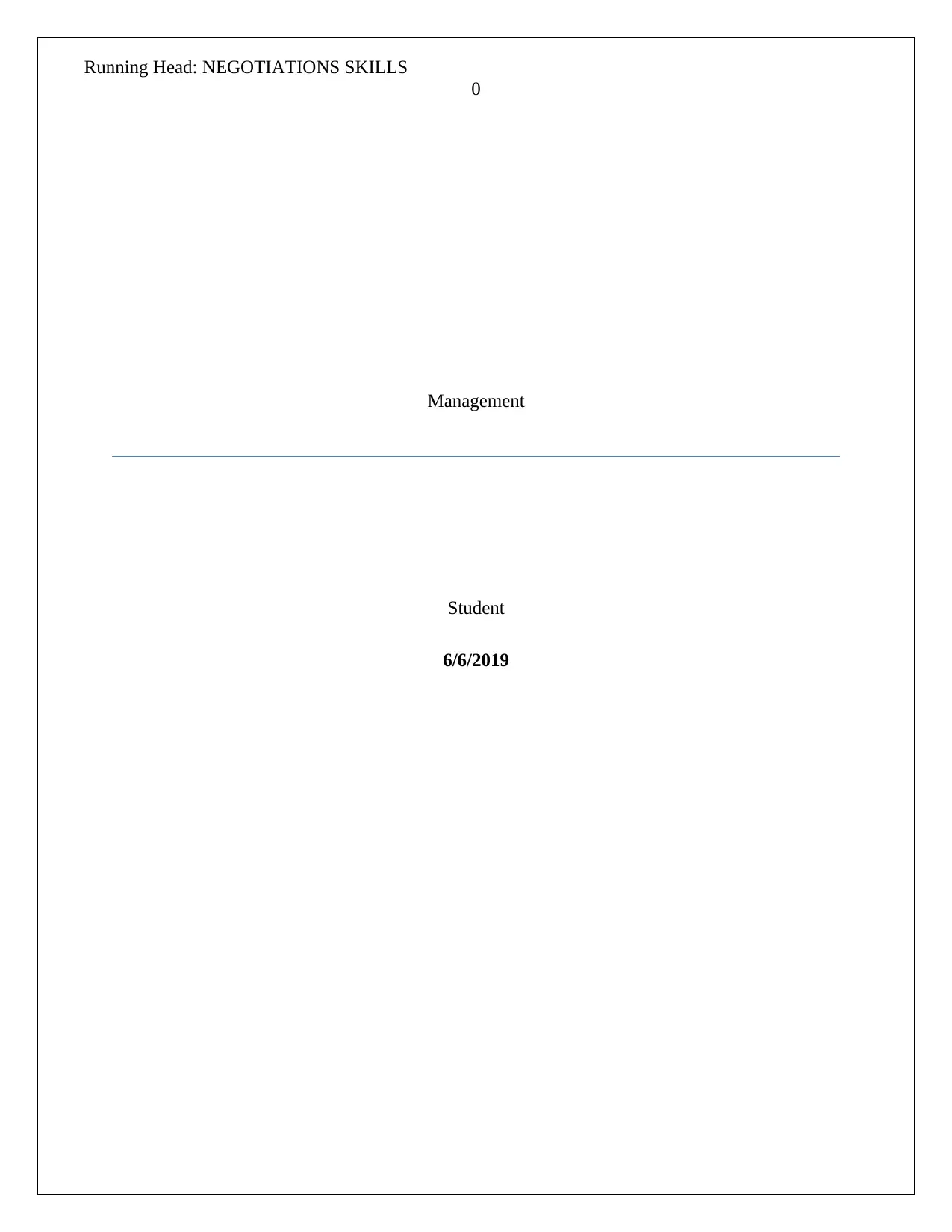
Running Head: NEGOTIATIONS SKILLS
0
Management
Student
6/6/2019
0
Management
Student
6/6/2019
Paraphrase This Document
Need a fresh take? Get an instant paraphrase of this document with our AI Paraphraser
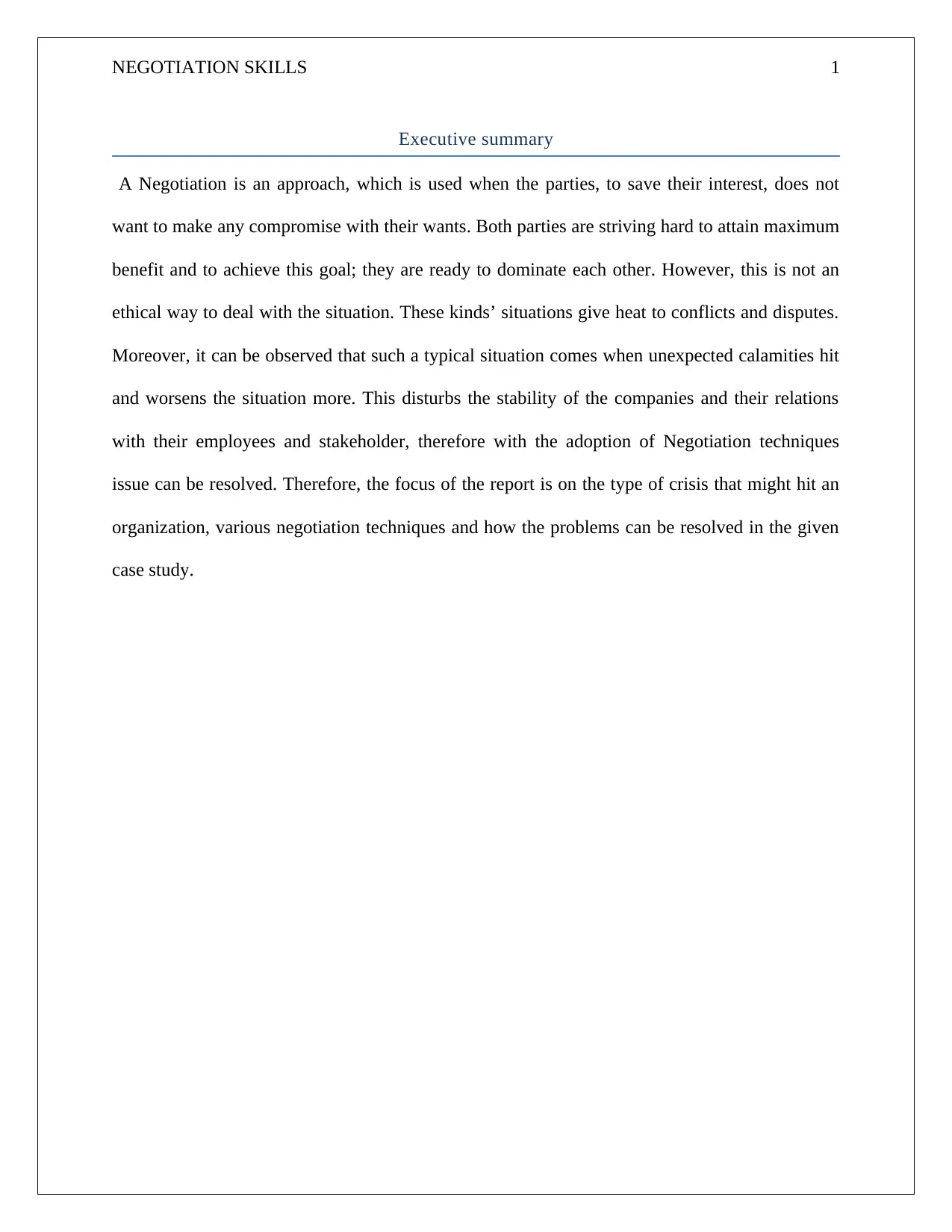
NEGOTIATION SKILLS 1
Executive summary
A Negotiation is an approach, which is used when the parties, to save their interest, does not
want to make any compromise with their wants. Both parties are striving hard to attain maximum
benefit and to achieve this goal; they are ready to dominate each other. However, this is not an
ethical way to deal with the situation. These kinds’ situations give heat to conflicts and disputes.
Moreover, it can be observed that such a typical situation comes when unexpected calamities hit
and worsens the situation more. This disturbs the stability of the companies and their relations
with their employees and stakeholder, therefore with the adoption of Negotiation techniques
issue can be resolved. Therefore, the focus of the report is on the type of crisis that might hit an
organization, various negotiation techniques and how the problems can be resolved in the given
case study.
Executive summary
A Negotiation is an approach, which is used when the parties, to save their interest, does not
want to make any compromise with their wants. Both parties are striving hard to attain maximum
benefit and to achieve this goal; they are ready to dominate each other. However, this is not an
ethical way to deal with the situation. These kinds’ situations give heat to conflicts and disputes.
Moreover, it can be observed that such a typical situation comes when unexpected calamities hit
and worsens the situation more. This disturbs the stability of the companies and their relations
with their employees and stakeholder, therefore with the adoption of Negotiation techniques
issue can be resolved. Therefore, the focus of the report is on the type of crisis that might hit an
organization, various negotiation techniques and how the problems can be resolved in the given
case study.
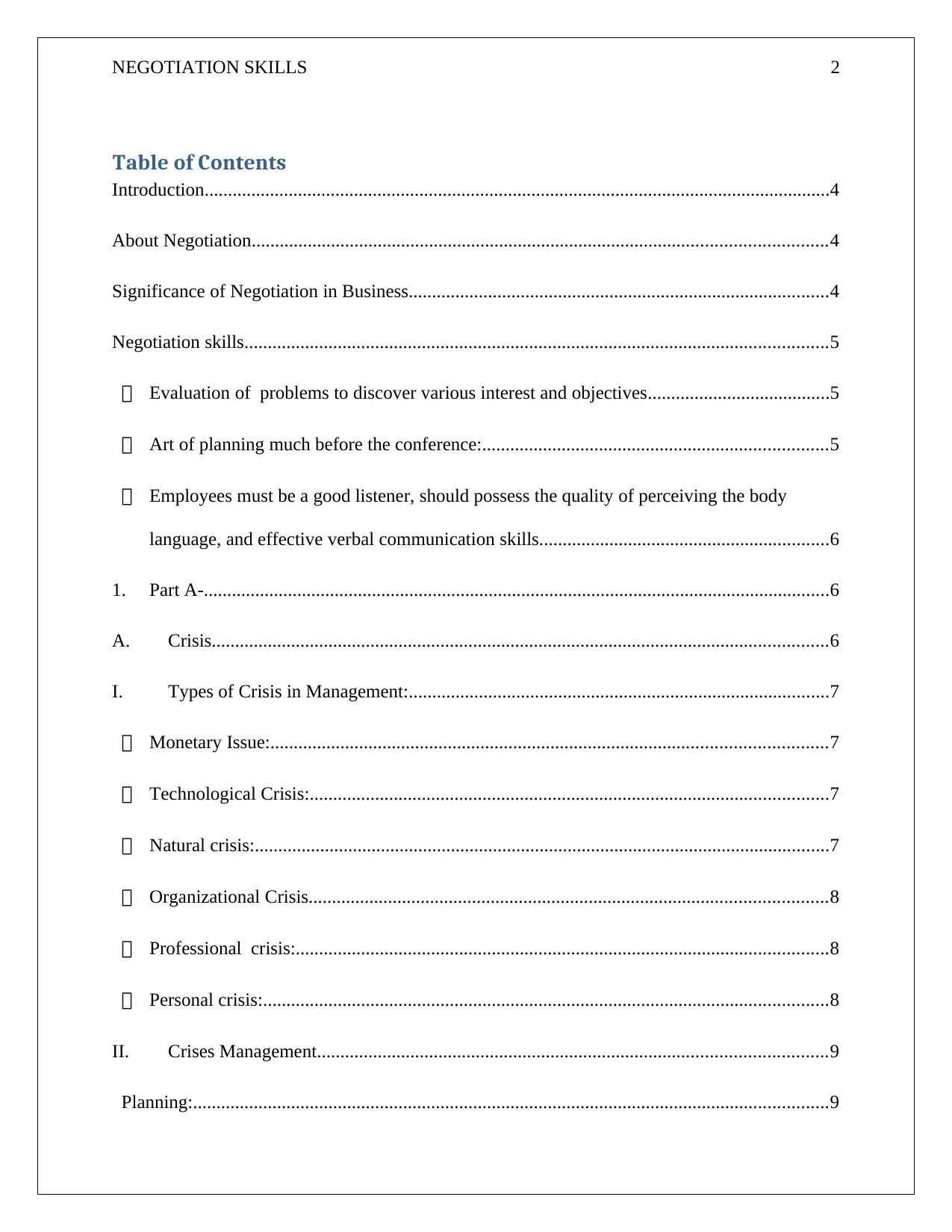
NEGOTIATION SKILLS 2
Table of Contents
Introduction......................................................................................................................................4
About Negotiation...........................................................................................................................4
Significance of Negotiation in Business..........................................................................................4
Negotiation skills.............................................................................................................................5
Evaluation of problems to discover various interest and objectives.......................................5
Art of planning much before the conference:..........................................................................5
Employees must be a good listener, should possess the quality of perceiving the body
language, and effective verbal communication skills..............................................................6
1. Part A-......................................................................................................................................6
A. Crisis....................................................................................................................................6
I. Types of Crisis in Management:..........................................................................................7
Monetary Issue:.......................................................................................................................7
Technological Crisis:...............................................................................................................7
Natural crisis:...........................................................................................................................7
Organizational Crisis...............................................................................................................8
Professional crisis:..................................................................................................................8
Personal crisis:.........................................................................................................................8
II. Crises Management.............................................................................................................9
Planning:........................................................................................................................................9
Table of Contents
Introduction......................................................................................................................................4
About Negotiation...........................................................................................................................4
Significance of Negotiation in Business..........................................................................................4
Negotiation skills.............................................................................................................................5
Evaluation of problems to discover various interest and objectives.......................................5
Art of planning much before the conference:..........................................................................5
Employees must be a good listener, should possess the quality of perceiving the body
language, and effective verbal communication skills..............................................................6
1. Part A-......................................................................................................................................6
A. Crisis....................................................................................................................................6
I. Types of Crisis in Management:..........................................................................................7
Monetary Issue:.......................................................................................................................7
Technological Crisis:...............................................................................................................7
Natural crisis:...........................................................................................................................7
Organizational Crisis...............................................................................................................8
Professional crisis:..................................................................................................................8
Personal crisis:.........................................................................................................................8
II. Crises Management.............................................................................................................9
Planning:........................................................................................................................................9
⊘ This is a preview!⊘
Do you want full access?
Subscribe today to unlock all pages.

Trusted by 1+ million students worldwide
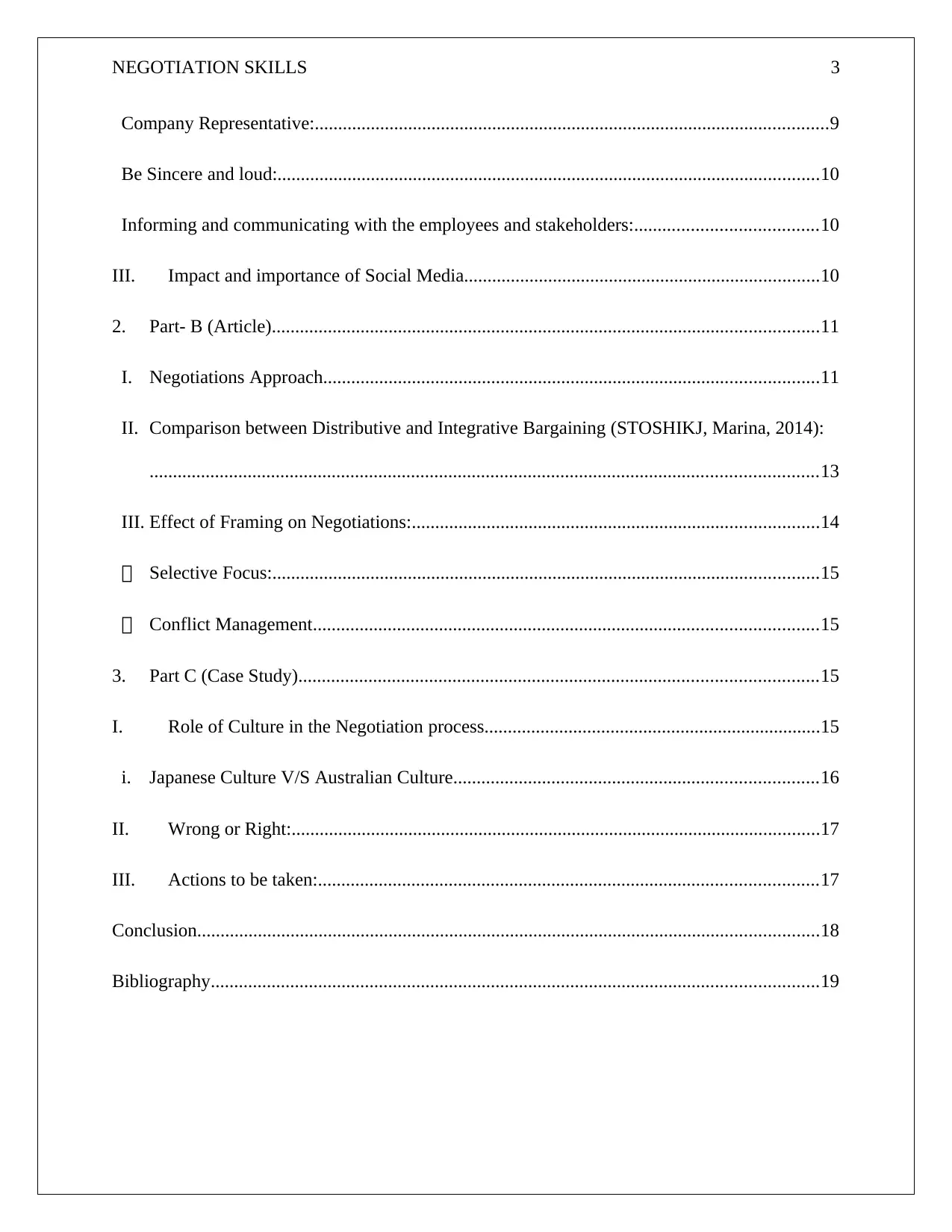
NEGOTIATION SKILLS 3
Company Representative:..............................................................................................................9
Be Sincere and loud:....................................................................................................................10
Informing and communicating with the employees and stakeholders:.......................................10
III. Impact and importance of Social Media............................................................................10
2. Part- B (Article).....................................................................................................................11
I. Negotiations Approach..........................................................................................................11
II. Comparison between Distributive and Integrative Bargaining (STOSHIKJ, Marina, 2014):
...............................................................................................................................................13
III. Effect of Framing on Negotiations:.......................................................................................14
Selective Focus:.....................................................................................................................15
Conflict Management............................................................................................................15
3. Part C (Case Study)...............................................................................................................15
I. Role of Culture in the Negotiation process........................................................................15
i. Japanese Culture V/S Australian Culture..............................................................................16
II. Wrong or Right:.................................................................................................................17
III. Actions to be taken:...........................................................................................................17
Conclusion.....................................................................................................................................18
Bibliography..................................................................................................................................19
Company Representative:..............................................................................................................9
Be Sincere and loud:....................................................................................................................10
Informing and communicating with the employees and stakeholders:.......................................10
III. Impact and importance of Social Media............................................................................10
2. Part- B (Article).....................................................................................................................11
I. Negotiations Approach..........................................................................................................11
II. Comparison between Distributive and Integrative Bargaining (STOSHIKJ, Marina, 2014):
...............................................................................................................................................13
III. Effect of Framing on Negotiations:.......................................................................................14
Selective Focus:.....................................................................................................................15
Conflict Management............................................................................................................15
3. Part C (Case Study)...............................................................................................................15
I. Role of Culture in the Negotiation process........................................................................15
i. Japanese Culture V/S Australian Culture..............................................................................16
II. Wrong or Right:.................................................................................................................17
III. Actions to be taken:...........................................................................................................17
Conclusion.....................................................................................................................................18
Bibliography..................................................................................................................................19
Paraphrase This Document
Need a fresh take? Get an instant paraphrase of this document with our AI Paraphraser
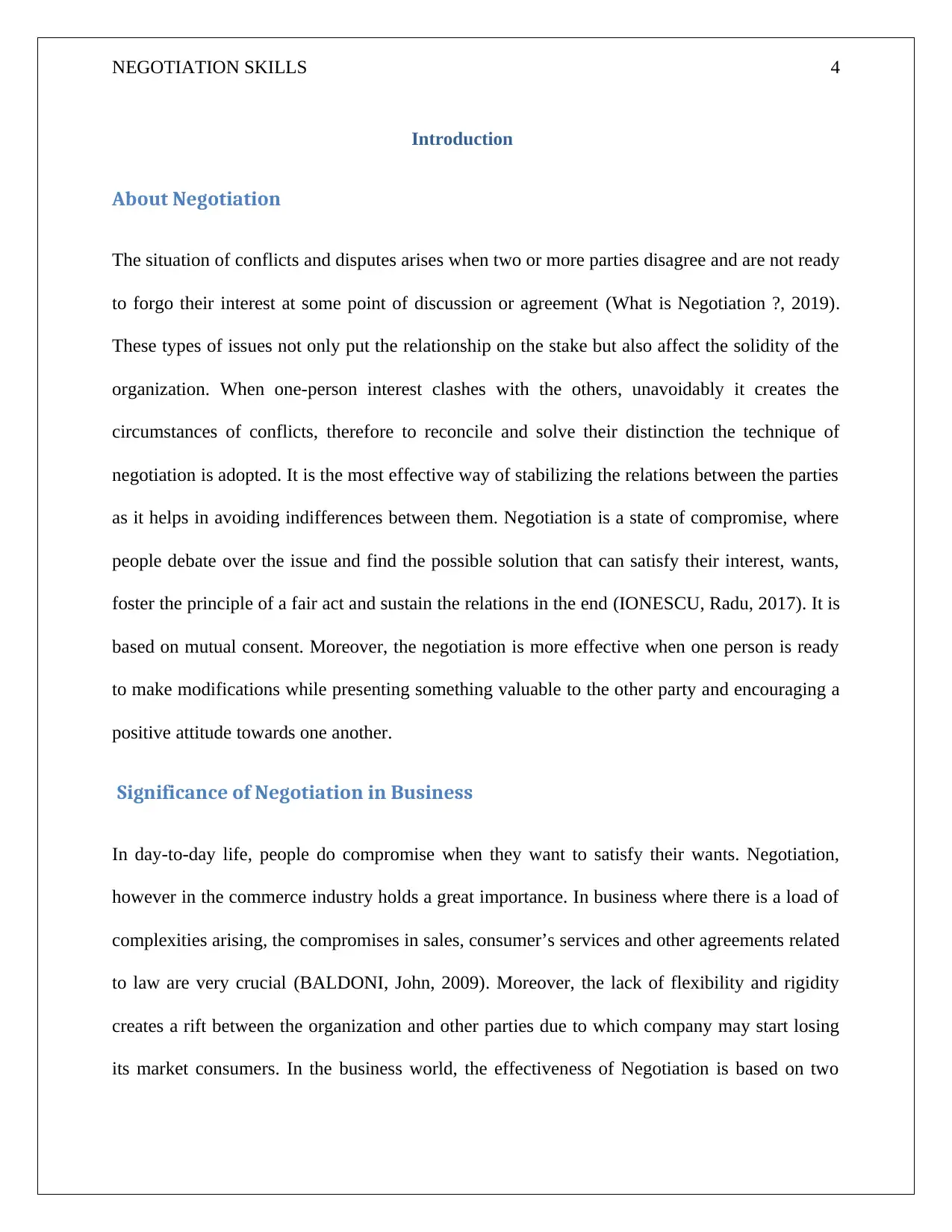
NEGOTIATION SKILLS 4
Introduction
About Negotiation
The situation of conflicts and disputes arises when two or more parties disagree and are not ready
to forgo their interest at some point of discussion or agreement (What is Negotiation ?, 2019).
These types of issues not only put the relationship on the stake but also affect the solidity of the
organization. When one-person interest clashes with the others, unavoidably it creates the
circumstances of conflicts, therefore to reconcile and solve their distinction the technique of
negotiation is adopted. It is the most effective way of stabilizing the relations between the parties
as it helps in avoiding indifferences between them. Negotiation is a state of compromise, where
people debate over the issue and find the possible solution that can satisfy their interest, wants,
foster the principle of a fair act and sustain the relations in the end (IONESCU, Radu, 2017). It is
based on mutual consent. Moreover, the negotiation is more effective when one person is ready
to make modifications while presenting something valuable to the other party and encouraging a
positive attitude towards one another.
Significance of Negotiation in Business
In day-to-day life, people do compromise when they want to satisfy their wants. Negotiation,
however in the commerce industry holds a great importance. In business where there is a load of
complexities arising, the compromises in sales, consumer’s services and other agreements related
to law are very crucial (BALDONI, John, 2009). Moreover, the lack of flexibility and rigidity
creates a rift between the organization and other parties due to which company may start losing
its market consumers. In the business world, the effectiveness of Negotiation is based on two
Introduction
About Negotiation
The situation of conflicts and disputes arises when two or more parties disagree and are not ready
to forgo their interest at some point of discussion or agreement (What is Negotiation ?, 2019).
These types of issues not only put the relationship on the stake but also affect the solidity of the
organization. When one-person interest clashes with the others, unavoidably it creates the
circumstances of conflicts, therefore to reconcile and solve their distinction the technique of
negotiation is adopted. It is the most effective way of stabilizing the relations between the parties
as it helps in avoiding indifferences between them. Negotiation is a state of compromise, where
people debate over the issue and find the possible solution that can satisfy their interest, wants,
foster the principle of a fair act and sustain the relations in the end (IONESCU, Radu, 2017). It is
based on mutual consent. Moreover, the negotiation is more effective when one person is ready
to make modifications while presenting something valuable to the other party and encouraging a
positive attitude towards one another.
Significance of Negotiation in Business
In day-to-day life, people do compromise when they want to satisfy their wants. Negotiation,
however in the commerce industry holds a great importance. In business where there is a load of
complexities arising, the compromises in sales, consumer’s services and other agreements related
to law are very crucial (BALDONI, John, 2009). Moreover, the lack of flexibility and rigidity
creates a rift between the organization and other parties due to which company may start losing
its market consumers. In the business world, the effectiveness of Negotiation is based on two
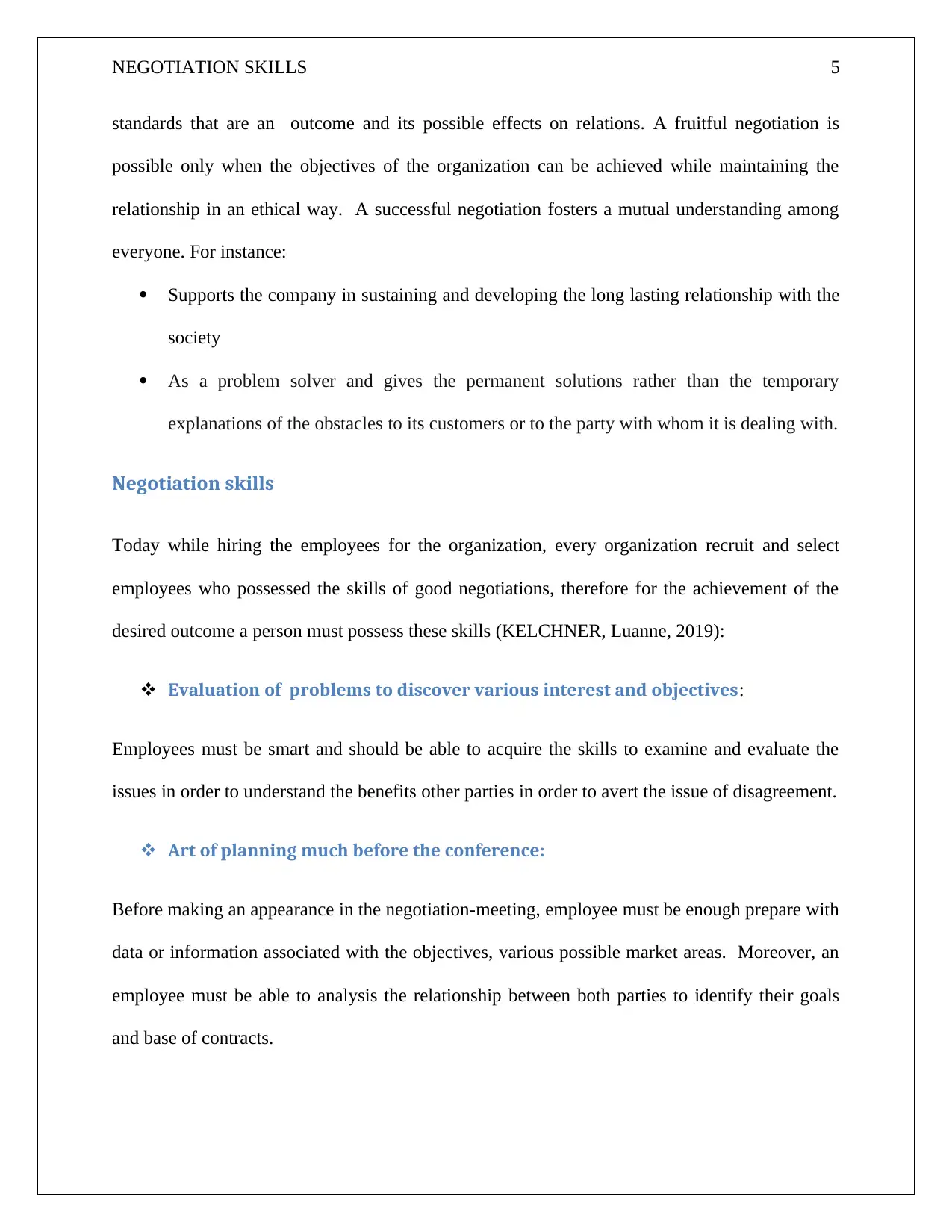
NEGOTIATION SKILLS 5
standards that are an outcome and its possible effects on relations. A fruitful negotiation is
possible only when the objectives of the organization can be achieved while maintaining the
relationship in an ethical way. A successful negotiation fosters a mutual understanding among
everyone. For instance:
Supports the company in sustaining and developing the long lasting relationship with the
society
As a problem solver and gives the permanent solutions rather than the temporary
explanations of the obstacles to its customers or to the party with whom it is dealing with.
Negotiation skills
Today while hiring the employees for the organization, every organization recruit and select
employees who possessed the skills of good negotiations, therefore for the achievement of the
desired outcome a person must possess these skills (KELCHNER, Luanne, 2019):
Evaluation of problems to discover various interest and objectives:
Employees must be smart and should be able to acquire the skills to examine and evaluate the
issues in order to understand the benefits other parties in order to avert the issue of disagreement.
Art of planning much before the conference:
Before making an appearance in the negotiation-meeting, employee must be enough prepare with
data or information associated with the objectives, various possible market areas. Moreover, an
employee must be able to analysis the relationship between both parties to identify their goals
and base of contracts.
standards that are an outcome and its possible effects on relations. A fruitful negotiation is
possible only when the objectives of the organization can be achieved while maintaining the
relationship in an ethical way. A successful negotiation fosters a mutual understanding among
everyone. For instance:
Supports the company in sustaining and developing the long lasting relationship with the
society
As a problem solver and gives the permanent solutions rather than the temporary
explanations of the obstacles to its customers or to the party with whom it is dealing with.
Negotiation skills
Today while hiring the employees for the organization, every organization recruit and select
employees who possessed the skills of good negotiations, therefore for the achievement of the
desired outcome a person must possess these skills (KELCHNER, Luanne, 2019):
Evaluation of problems to discover various interest and objectives:
Employees must be smart and should be able to acquire the skills to examine and evaluate the
issues in order to understand the benefits other parties in order to avert the issue of disagreement.
Art of planning much before the conference:
Before making an appearance in the negotiation-meeting, employee must be enough prepare with
data or information associated with the objectives, various possible market areas. Moreover, an
employee must be able to analysis the relationship between both parties to identify their goals
and base of contracts.
⊘ This is a preview!⊘
Do you want full access?
Subscribe today to unlock all pages.

Trusted by 1+ million students worldwide
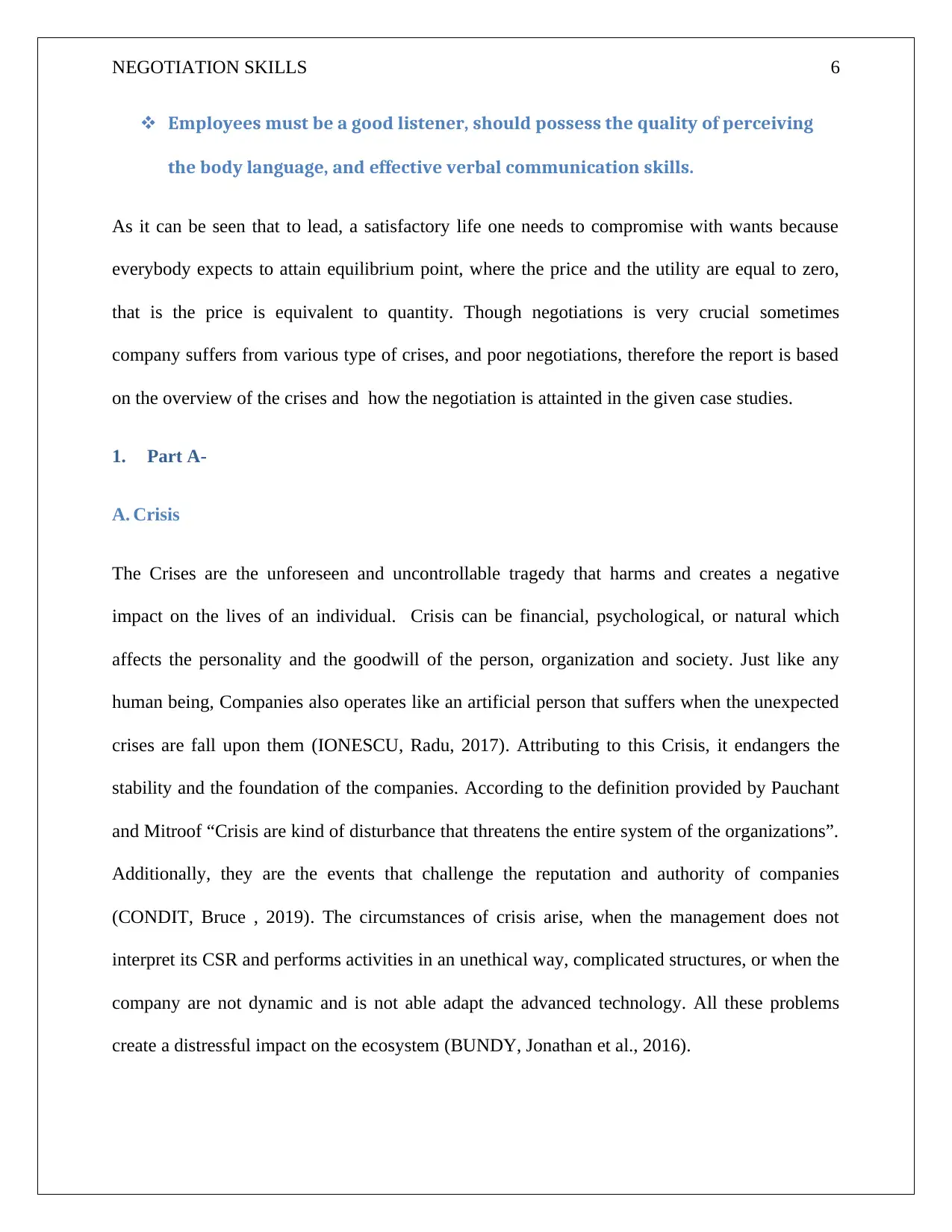
NEGOTIATION SKILLS 6
Employees must be a good listener, should possess the quality of perceiving
the body language, and effective verbal communication skills.
As it can be seen that to lead, a satisfactory life one needs to compromise with wants because
everybody expects to attain equilibrium point, where the price and the utility are equal to zero,
that is the price is equivalent to quantity. Though negotiations is very crucial sometimes
company suffers from various type of crises, and poor negotiations, therefore the report is based
on the overview of the crises and how the negotiation is attainted in the given case studies.
1. Part A-
A. Crisis
The Crises are the unforeseen and uncontrollable tragedy that harms and creates a negative
impact on the lives of an individual. Crisis can be financial, psychological, or natural which
affects the personality and the goodwill of the person, organization and society. Just like any
human being, Companies also operates like an artificial person that suffers when the unexpected
crises are fall upon them (IONESCU, Radu, 2017). Attributing to this Crisis, it endangers the
stability and the foundation of the companies. According to the definition provided by Pauchant
and Mitroof “Crisis are kind of disturbance that threatens the entire system of the organizations”.
Additionally, they are the events that challenge the reputation and authority of companies
(CONDIT, Bruce , 2019). The circumstances of crisis arise, when the management does not
interpret its CSR and performs activities in an unethical way, complicated structures, or when the
company are not dynamic and is not able adapt the advanced technology. All these problems
create a distressful impact on the ecosystem (BUNDY, Jonathan et al., 2016).
Employees must be a good listener, should possess the quality of perceiving
the body language, and effective verbal communication skills.
As it can be seen that to lead, a satisfactory life one needs to compromise with wants because
everybody expects to attain equilibrium point, where the price and the utility are equal to zero,
that is the price is equivalent to quantity. Though negotiations is very crucial sometimes
company suffers from various type of crises, and poor negotiations, therefore the report is based
on the overview of the crises and how the negotiation is attainted in the given case studies.
1. Part A-
A. Crisis
The Crises are the unforeseen and uncontrollable tragedy that harms and creates a negative
impact on the lives of an individual. Crisis can be financial, psychological, or natural which
affects the personality and the goodwill of the person, organization and society. Just like any
human being, Companies also operates like an artificial person that suffers when the unexpected
crises are fall upon them (IONESCU, Radu, 2017). Attributing to this Crisis, it endangers the
stability and the foundation of the companies. According to the definition provided by Pauchant
and Mitroof “Crisis are kind of disturbance that threatens the entire system of the organizations”.
Additionally, they are the events that challenge the reputation and authority of companies
(CONDIT, Bruce , 2019). The circumstances of crisis arise, when the management does not
interpret its CSR and performs activities in an unethical way, complicated structures, or when the
company are not dynamic and is not able adapt the advanced technology. All these problems
create a distressful impact on the ecosystem (BUNDY, Jonathan et al., 2016).
Paraphrase This Document
Need a fresh take? Get an instant paraphrase of this document with our AI Paraphraser
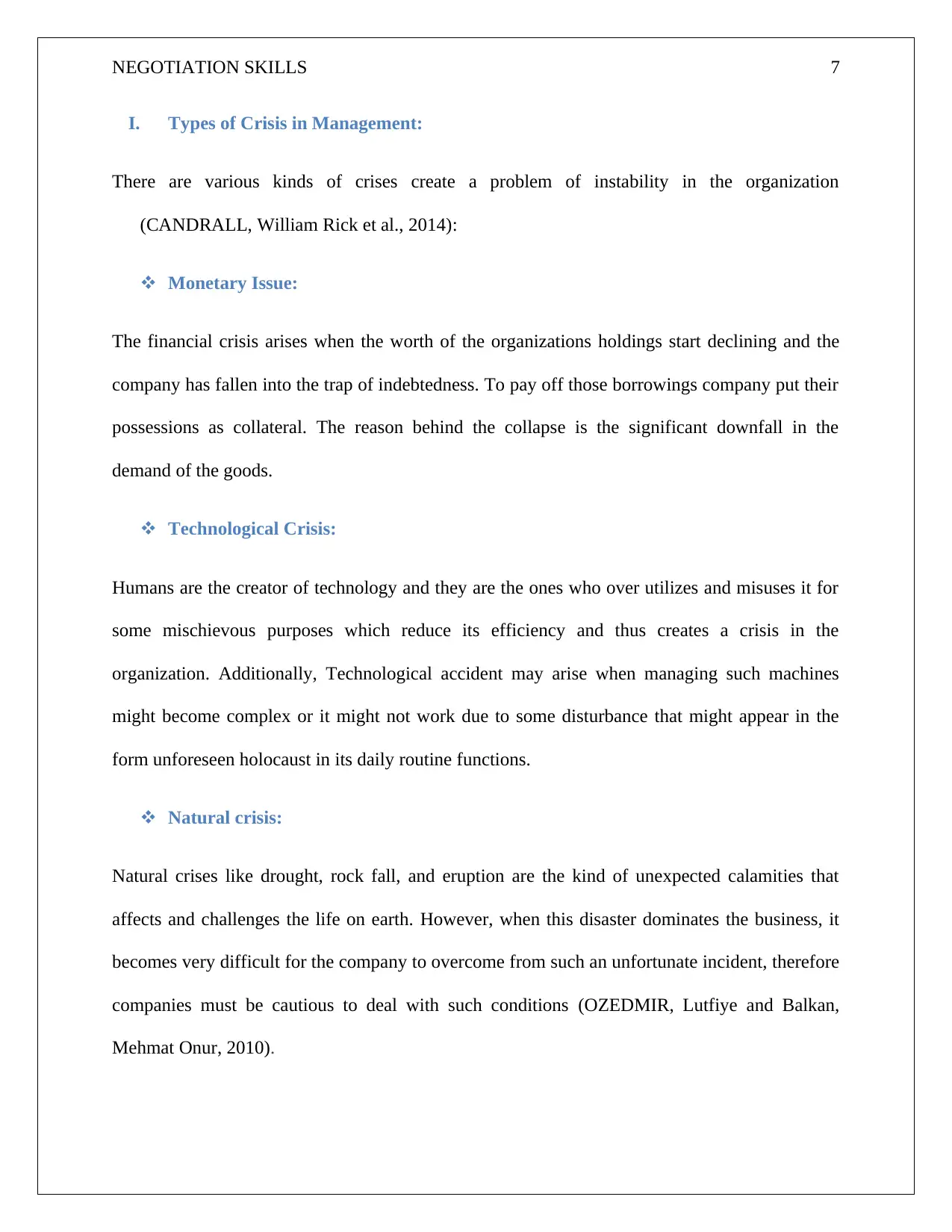
NEGOTIATION SKILLS 7
I. Types of Crisis in Management:
There are various kinds of crises create a problem of instability in the organization
(CANDRALL, William Rick et al., 2014):
Monetary Issue:
The financial crisis arises when the worth of the organizations holdings start declining and the
company has fallen into the trap of indebtedness. To pay off those borrowings company put their
possessions as collateral. The reason behind the collapse is the significant downfall in the
demand of the goods.
Technological Crisis:
Humans are the creator of technology and they are the ones who over utilizes and misuses it for
some mischievous purposes which reduce its efficiency and thus creates a crisis in the
organization. Additionally, Technological accident may arise when managing such machines
might become complex or it might not work due to some disturbance that might appear in the
form unforeseen holocaust in its daily routine functions.
Natural crisis:
Natural crises like drought, rock fall, and eruption are the kind of unexpected calamities that
affects and challenges the life on earth. However, when this disaster dominates the business, it
becomes very difficult for the company to overcome from such an unfortunate incident, therefore
companies must be cautious to deal with such conditions (OZEDMIR, Lutfiye and Balkan,
Mehmat Onur, 2010).
I. Types of Crisis in Management:
There are various kinds of crises create a problem of instability in the organization
(CANDRALL, William Rick et al., 2014):
Monetary Issue:
The financial crisis arises when the worth of the organizations holdings start declining and the
company has fallen into the trap of indebtedness. To pay off those borrowings company put their
possessions as collateral. The reason behind the collapse is the significant downfall in the
demand of the goods.
Technological Crisis:
Humans are the creator of technology and they are the ones who over utilizes and misuses it for
some mischievous purposes which reduce its efficiency and thus creates a crisis in the
organization. Additionally, Technological accident may arise when managing such machines
might become complex or it might not work due to some disturbance that might appear in the
form unforeseen holocaust in its daily routine functions.
Natural crisis:
Natural crises like drought, rock fall, and eruption are the kind of unexpected calamities that
affects and challenges the life on earth. However, when this disaster dominates the business, it
becomes very difficult for the company to overcome from such an unfortunate incident, therefore
companies must be cautious to deal with such conditions (OZEDMIR, Lutfiye and Balkan,
Mehmat Onur, 2010).
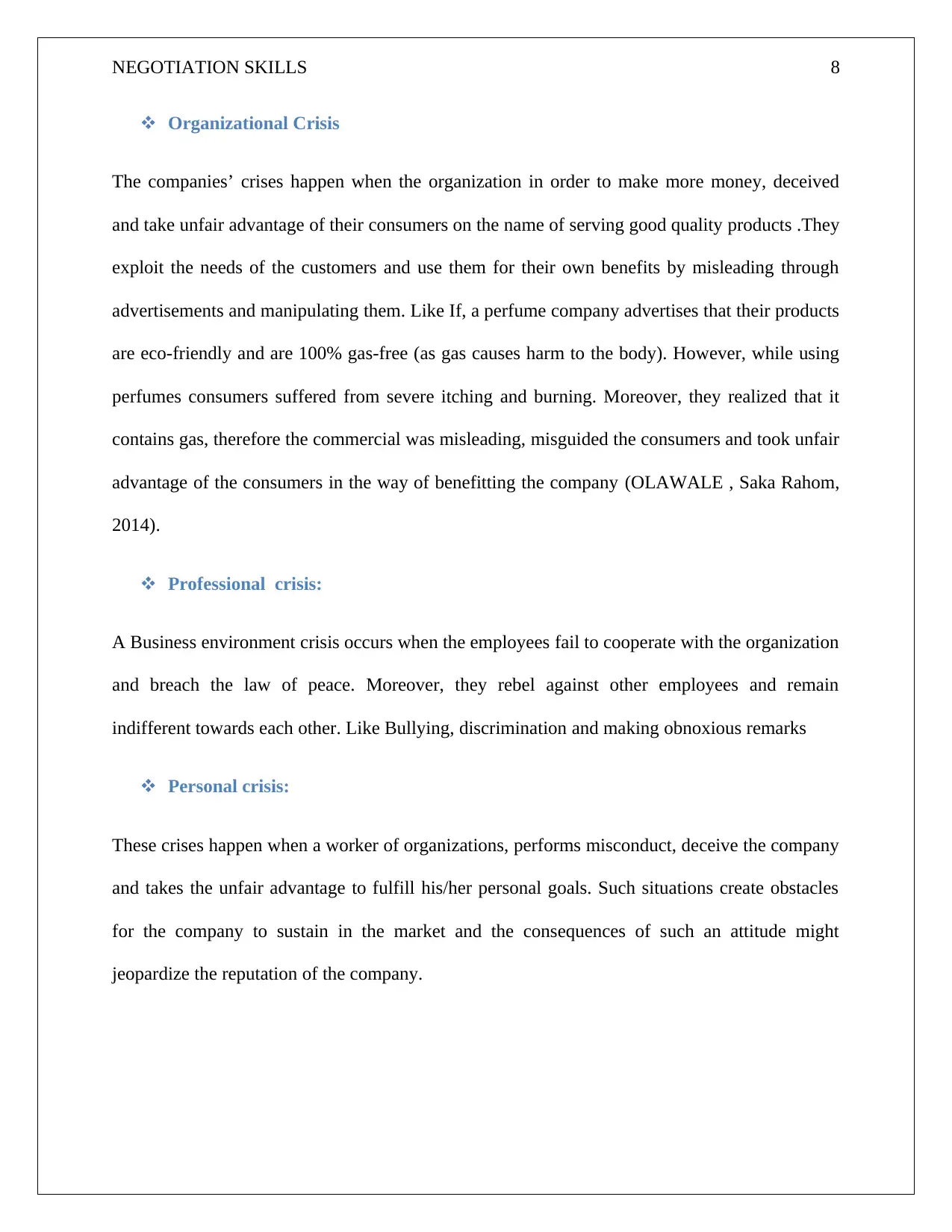
NEGOTIATION SKILLS 8
Organizational Crisis
The companies’ crises happen when the organization in order to make more money, deceived
and take unfair advantage of their consumers on the name of serving good quality products .They
exploit the needs of the customers and use them for their own benefits by misleading through
advertisements and manipulating them. Like If, a perfume company advertises that their products
are eco-friendly and are 100% gas-free (as gas causes harm to the body). However, while using
perfumes consumers suffered from severe itching and burning. Moreover, they realized that it
contains gas, therefore the commercial was misleading, misguided the consumers and took unfair
advantage of the consumers in the way of benefitting the company (OLAWALE , Saka Rahom,
2014).
Professional crisis:
A Business environment crisis occurs when the employees fail to cooperate with the organization
and breach the law of peace. Moreover, they rebel against other employees and remain
indifferent towards each other. Like Bullying, discrimination and making obnoxious remarks
Personal crisis:
These crises happen when a worker of organizations, performs misconduct, deceive the company
and takes the unfair advantage to fulfill his/her personal goals. Such situations create obstacles
for the company to sustain in the market and the consequences of such an attitude might
jeopardize the reputation of the company.
Organizational Crisis
The companies’ crises happen when the organization in order to make more money, deceived
and take unfair advantage of their consumers on the name of serving good quality products .They
exploit the needs of the customers and use them for their own benefits by misleading through
advertisements and manipulating them. Like If, a perfume company advertises that their products
are eco-friendly and are 100% gas-free (as gas causes harm to the body). However, while using
perfumes consumers suffered from severe itching and burning. Moreover, they realized that it
contains gas, therefore the commercial was misleading, misguided the consumers and took unfair
advantage of the consumers in the way of benefitting the company (OLAWALE , Saka Rahom,
2014).
Professional crisis:
A Business environment crisis occurs when the employees fail to cooperate with the organization
and breach the law of peace. Moreover, they rebel against other employees and remain
indifferent towards each other. Like Bullying, discrimination and making obnoxious remarks
Personal crisis:
These crises happen when a worker of organizations, performs misconduct, deceive the company
and takes the unfair advantage to fulfill his/her personal goals. Such situations create obstacles
for the company to sustain in the market and the consequences of such an attitude might
jeopardize the reputation of the company.
⊘ This is a preview!⊘
Do you want full access?
Subscribe today to unlock all pages.

Trusted by 1+ million students worldwide
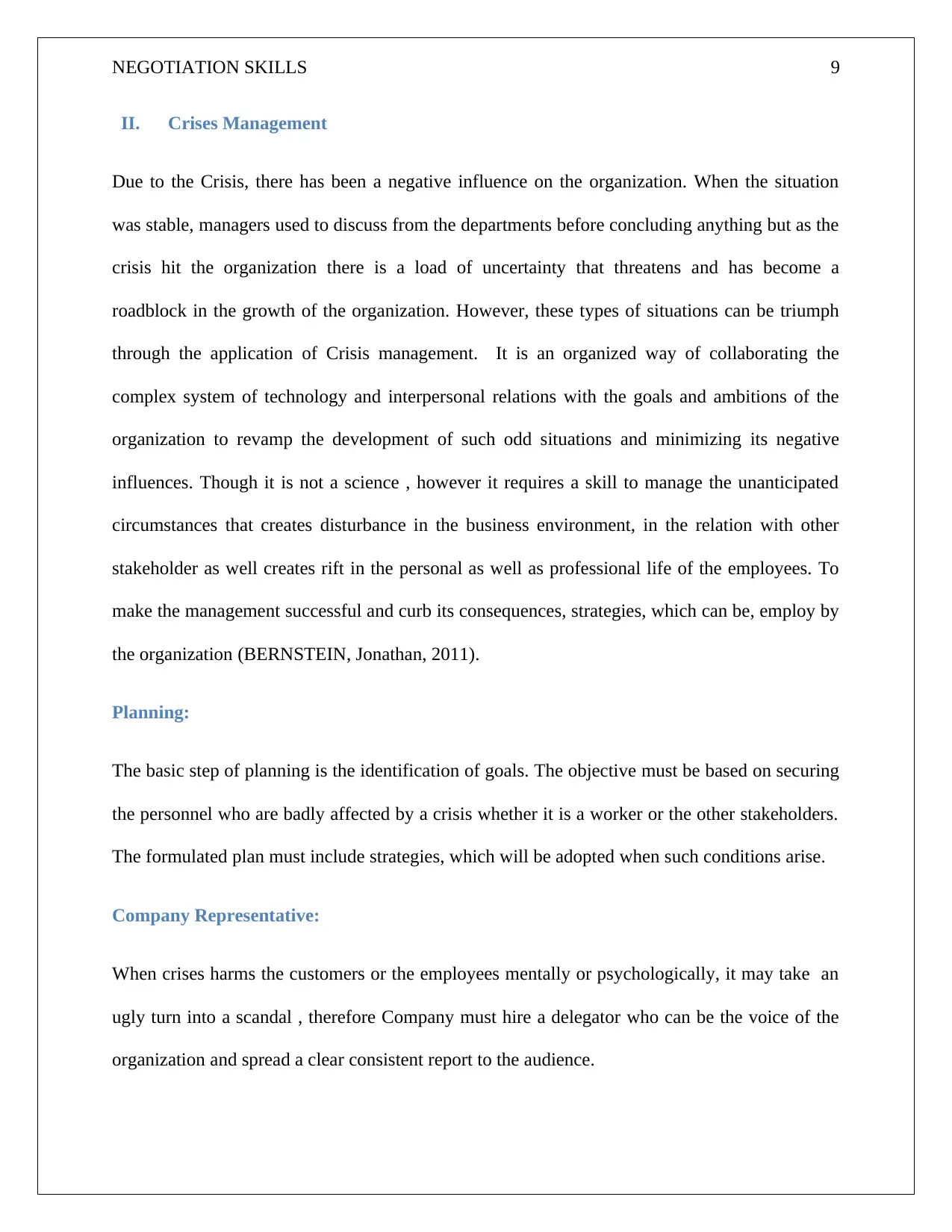
NEGOTIATION SKILLS 9
II. Crises Management
Due to the Crisis, there has been a negative influence on the organization. When the situation
was stable, managers used to discuss from the departments before concluding anything but as the
crisis hit the organization there is a load of uncertainty that threatens and has become a
roadblock in the growth of the organization. However, these types of situations can be triumph
through the application of Crisis management. It is an organized way of collaborating the
complex system of technology and interpersonal relations with the goals and ambitions of the
organization to revamp the development of such odd situations and minimizing its negative
influences. Though it is not a science , however it requires a skill to manage the unanticipated
circumstances that creates disturbance in the business environment, in the relation with other
stakeholder as well creates rift in the personal as well as professional life of the employees. To
make the management successful and curb its consequences, strategies, which can be, employ by
the organization (BERNSTEIN, Jonathan, 2011).
Planning:
The basic step of planning is the identification of goals. The objective must be based on securing
the personnel who are badly affected by a crisis whether it is a worker or the other stakeholders.
The formulated plan must include strategies, which will be adopted when such conditions arise.
Company Representative:
When crises harms the customers or the employees mentally or psychologically, it may take an
ugly turn into a scandal , therefore Company must hire a delegator who can be the voice of the
organization and spread a clear consistent report to the audience.
II. Crises Management
Due to the Crisis, there has been a negative influence on the organization. When the situation
was stable, managers used to discuss from the departments before concluding anything but as the
crisis hit the organization there is a load of uncertainty that threatens and has become a
roadblock in the growth of the organization. However, these types of situations can be triumph
through the application of Crisis management. It is an organized way of collaborating the
complex system of technology and interpersonal relations with the goals and ambitions of the
organization to revamp the development of such odd situations and minimizing its negative
influences. Though it is not a science , however it requires a skill to manage the unanticipated
circumstances that creates disturbance in the business environment, in the relation with other
stakeholder as well creates rift in the personal as well as professional life of the employees. To
make the management successful and curb its consequences, strategies, which can be, employ by
the organization (BERNSTEIN, Jonathan, 2011).
Planning:
The basic step of planning is the identification of goals. The objective must be based on securing
the personnel who are badly affected by a crisis whether it is a worker or the other stakeholders.
The formulated plan must include strategies, which will be adopted when such conditions arise.
Company Representative:
When crises harms the customers or the employees mentally or psychologically, it may take an
ugly turn into a scandal , therefore Company must hire a delegator who can be the voice of the
organization and spread a clear consistent report to the audience.
Paraphrase This Document
Need a fresh take? Get an instant paraphrase of this document with our AI Paraphraser
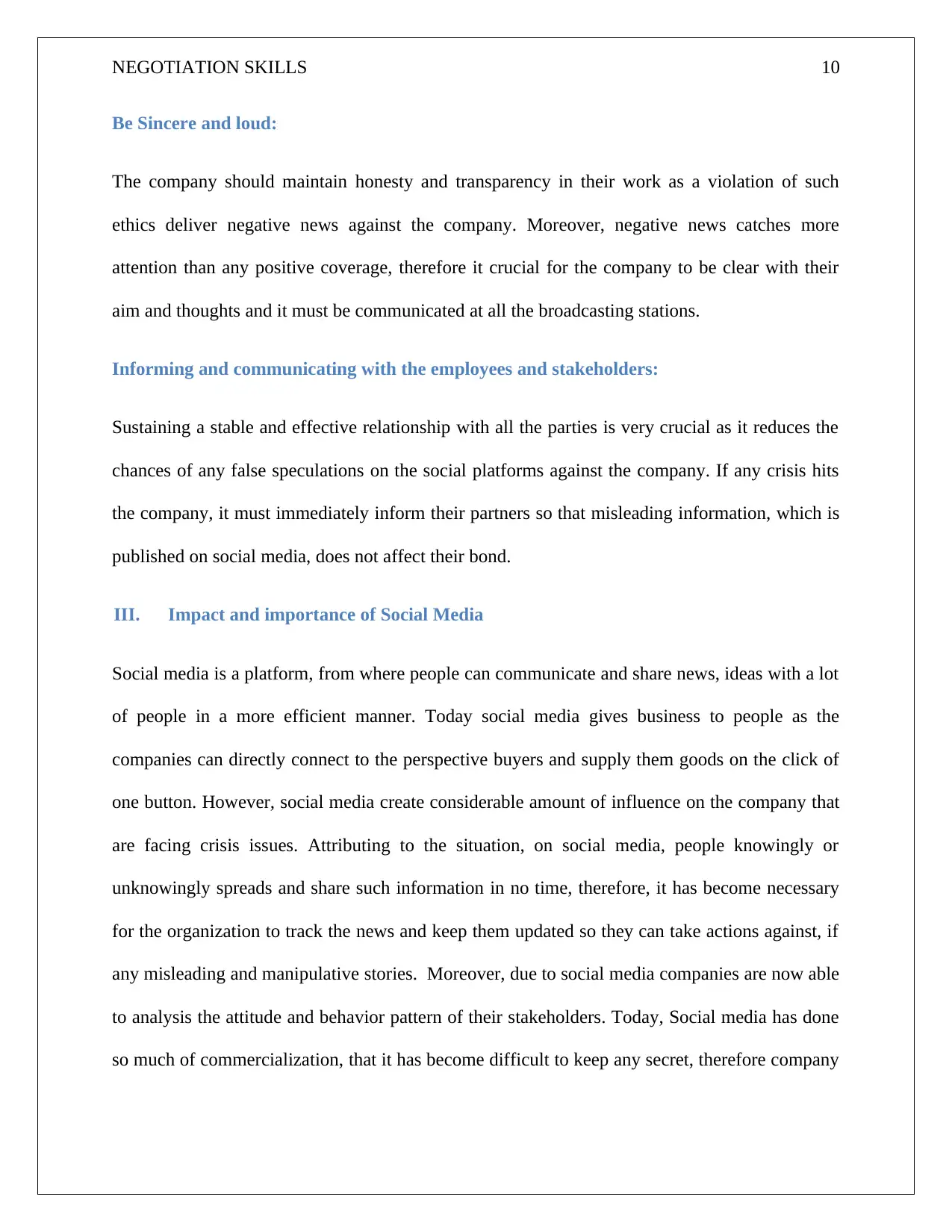
NEGOTIATION SKILLS 10
Be Sincere and loud:
The company should maintain honesty and transparency in their work as a violation of such
ethics deliver negative news against the company. Moreover, negative news catches more
attention than any positive coverage, therefore it crucial for the company to be clear with their
aim and thoughts and it must be communicated at all the broadcasting stations.
Informing and communicating with the employees and stakeholders:
Sustaining a stable and effective relationship with all the parties is very crucial as it reduces the
chances of any false speculations on the social platforms against the company. If any crisis hits
the company, it must immediately inform their partners so that misleading information, which is
published on social media, does not affect their bond.
III. Impact and importance of Social Media
Social media is a platform, from where people can communicate and share news, ideas with a lot
of people in a more efficient manner. Today social media gives business to people as the
companies can directly connect to the perspective buyers and supply them goods on the click of
one button. However, social media create considerable amount of influence on the company that
are facing crisis issues. Attributing to the situation, on social media, people knowingly or
unknowingly spreads and share such information in no time, therefore, it has become necessary
for the organization to track the news and keep them updated so they can take actions against, if
any misleading and manipulative stories. Moreover, due to social media companies are now able
to analysis the attitude and behavior pattern of their stakeholders. Today, Social media has done
so much of commercialization, that it has become difficult to keep any secret, therefore company
Be Sincere and loud:
The company should maintain honesty and transparency in their work as a violation of such
ethics deliver negative news against the company. Moreover, negative news catches more
attention than any positive coverage, therefore it crucial for the company to be clear with their
aim and thoughts and it must be communicated at all the broadcasting stations.
Informing and communicating with the employees and stakeholders:
Sustaining a stable and effective relationship with all the parties is very crucial as it reduces the
chances of any false speculations on the social platforms against the company. If any crisis hits
the company, it must immediately inform their partners so that misleading information, which is
published on social media, does not affect their bond.
III. Impact and importance of Social Media
Social media is a platform, from where people can communicate and share news, ideas with a lot
of people in a more efficient manner. Today social media gives business to people as the
companies can directly connect to the perspective buyers and supply them goods on the click of
one button. However, social media create considerable amount of influence on the company that
are facing crisis issues. Attributing to the situation, on social media, people knowingly or
unknowingly spreads and share such information in no time, therefore, it has become necessary
for the organization to track the news and keep them updated so they can take actions against, if
any misleading and manipulative stories. Moreover, due to social media companies are now able
to analysis the attitude and behavior pattern of their stakeholders. Today, Social media has done
so much of commercialization, that it has become difficult to keep any secret, therefore company
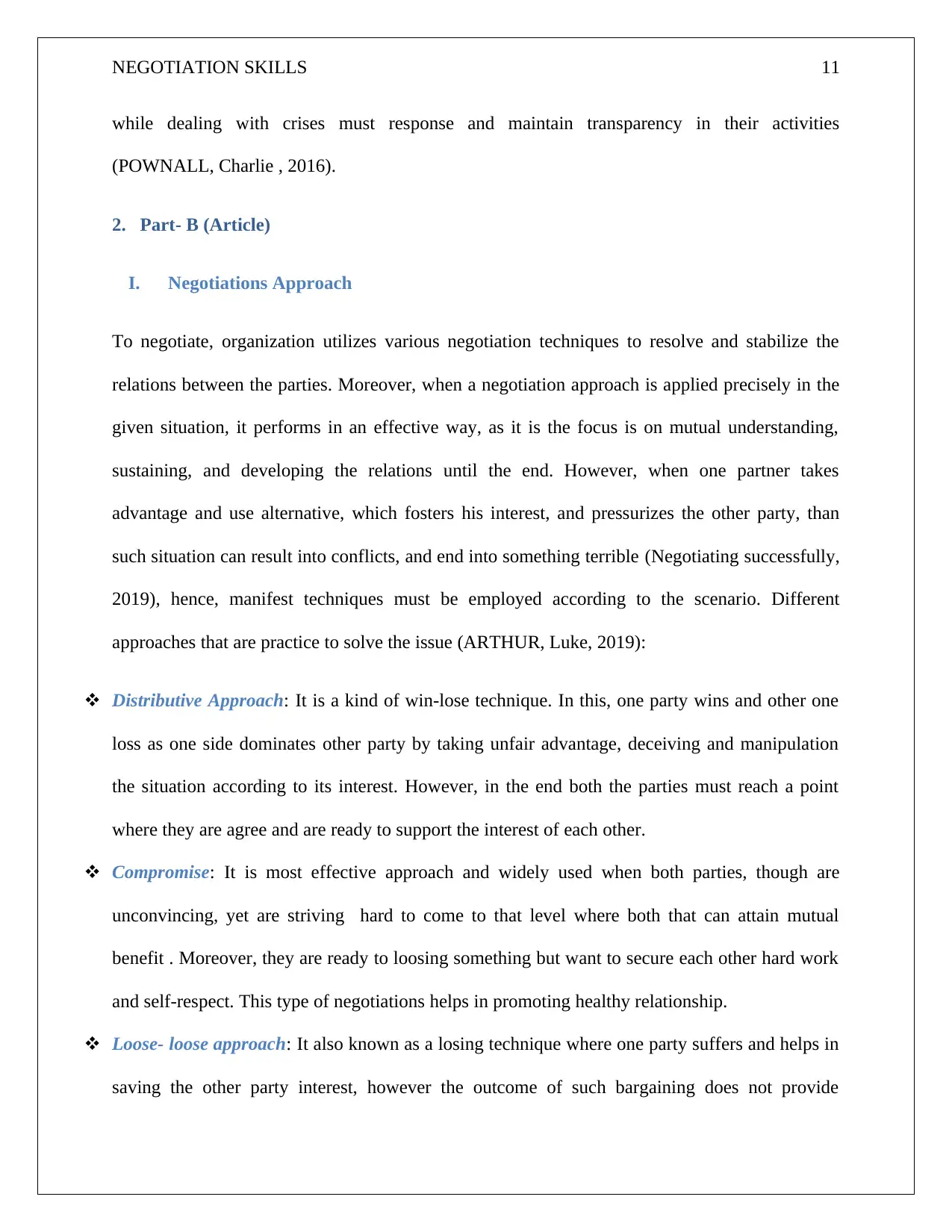
NEGOTIATION SKILLS 11
while dealing with crises must response and maintain transparency in their activities
(POWNALL, Charlie , 2016).
2. Part- B (Article)
I. Negotiations Approach
To negotiate, organization utilizes various negotiation techniques to resolve and stabilize the
relations between the parties. Moreover, when a negotiation approach is applied precisely in the
given situation, it performs in an effective way, as it is the focus is on mutual understanding,
sustaining, and developing the relations until the end. However, when one partner takes
advantage and use alternative, which fosters his interest, and pressurizes the other party, than
such situation can result into conflicts, and end into something terrible (Negotiating successfully,
2019), hence, manifest techniques must be employed according to the scenario. Different
approaches that are practice to solve the issue (ARTHUR, Luke, 2019):
Distributive Approach: It is a kind of win-lose technique. In this, one party wins and other one
loss as one side dominates other party by taking unfair advantage, deceiving and manipulation
the situation according to its interest. However, in the end both the parties must reach a point
where they are agree and are ready to support the interest of each other.
Compromise: It is most effective approach and widely used when both parties, though are
unconvincing, yet are striving hard to come to that level where both that can attain mutual
benefit . Moreover, they are ready to loosing something but want to secure each other hard work
and self-respect. This type of negotiations helps in promoting healthy relationship.
Loose- loose approach: It also known as a losing technique where one party suffers and helps in
saving the other party interest, however the outcome of such bargaining does not provide
while dealing with crises must response and maintain transparency in their activities
(POWNALL, Charlie , 2016).
2. Part- B (Article)
I. Negotiations Approach
To negotiate, organization utilizes various negotiation techniques to resolve and stabilize the
relations between the parties. Moreover, when a negotiation approach is applied precisely in the
given situation, it performs in an effective way, as it is the focus is on mutual understanding,
sustaining, and developing the relations until the end. However, when one partner takes
advantage and use alternative, which fosters his interest, and pressurizes the other party, than
such situation can result into conflicts, and end into something terrible (Negotiating successfully,
2019), hence, manifest techniques must be employed according to the scenario. Different
approaches that are practice to solve the issue (ARTHUR, Luke, 2019):
Distributive Approach: It is a kind of win-lose technique. In this, one party wins and other one
loss as one side dominates other party by taking unfair advantage, deceiving and manipulation
the situation according to its interest. However, in the end both the parties must reach a point
where they are agree and are ready to support the interest of each other.
Compromise: It is most effective approach and widely used when both parties, though are
unconvincing, yet are striving hard to come to that level where both that can attain mutual
benefit . Moreover, they are ready to loosing something but want to secure each other hard work
and self-respect. This type of negotiations helps in promoting healthy relationship.
Loose- loose approach: It also known as a losing technique where one party suffers and helps in
saving the other party interest, however the outcome of such bargaining does not provide
⊘ This is a preview!⊘
Do you want full access?
Subscribe today to unlock all pages.

Trusted by 1+ million students worldwide
1 out of 23
Related Documents
Your All-in-One AI-Powered Toolkit for Academic Success.
+13062052269
info@desklib.com
Available 24*7 on WhatsApp / Email
![[object Object]](/_next/static/media/star-bottom.7253800d.svg)
Unlock your academic potential
Copyright © 2020–2026 A2Z Services. All Rights Reserved. Developed and managed by ZUCOL.




